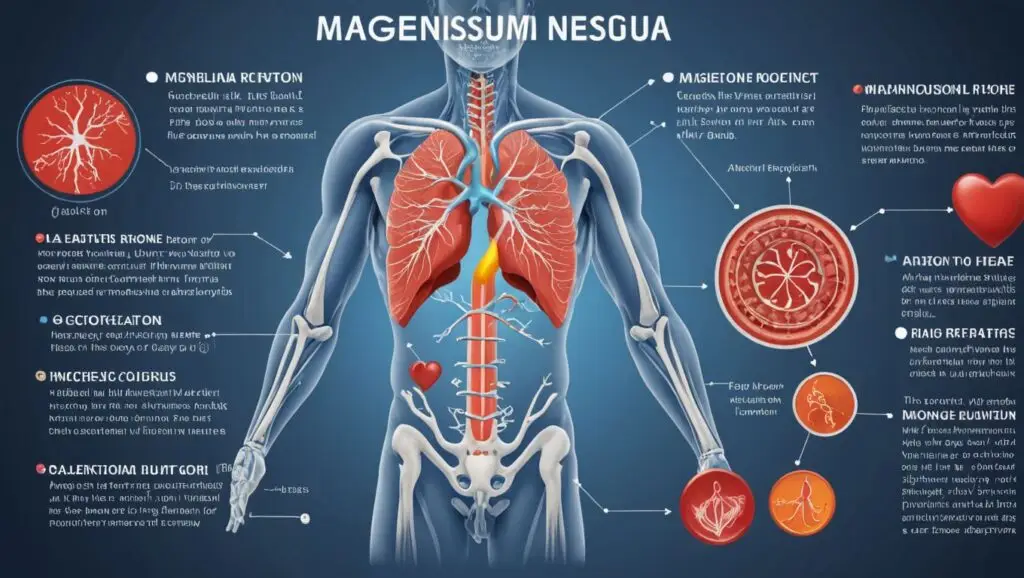Discover the alarming signs of magnesium deficiency and understand how to recognize this crucial health concern effectively. It is essential to be aware of the alarming signs to address magnesium deficiency early.

Table of Contents

Introduction
Brief Overview of Magnesium and Its Importance in the Body
Magnesium is an essential mineral that plays a critical role in numerous bodily functions. It is involved in over 300 enzymatic reactions, including energy production, DNA synthesis, and protein synthesis. Magnesium also helps regulate muscle and nerve function, blood sugar levels, and blood pressure. It contributes to bone health and supports a healthy immune system.
Statistics on Magnesium Deficiency Prevalence
Magnesium deficiency is a common health issue worldwide. According to studies, approximately 50% of people in the United States consume less than the recommended daily amount of magnesium. In India, dietary magnesium intake is also below the recommended levels for a significant portion of the population. This widespread deficiency can lead to various health problems if not addressed.
Purpose of the Article
This article aims to raise awareness about the importance of magnesium, highlight the signs and symptoms of magnesium deficiency, and provide practical tips on how to maintain adequate magnesium levels through diet and lifestyle changes.

Section 1: Understanding Magnesium
Recognizing the alarming signs of magnesium deficiency can empower you to take proactive steps towards better health.
What is Magnesium?
Magnesium is a vital mineral and the fourth most abundant in the human body. It is found in every cell and is crucial for numerous physiological functions. Despite its importance, many people do not get enough magnesium from their diets, leading to potential deficiencies.
Role of Magnesium in the Body
- Energy Production: Magnesium plays a key role in converting food into energy. It is a cofactor in the production of ATP (adenosine triphosphate), the primary energy carrier in cells.
- Muscle and Nerve Function: Magnesium helps regulate muscle contractions and nerve signaling. It prevents muscle cramps and spasms and supports overall muscle health.
- Bone Health: About 60% of the body’s magnesium is stored in the bones. Magnesium helps maintain bone density and prevents osteoporosis.
- Blood Sugar Regulation: Magnesium is involved in insulin secretion and function, helping to regulate blood sugar levels. It can reduce the risk of type 2 diabetes.
- Heart Health: Magnesium helps maintain a regular heartbeat and supports cardiovascular health. It can prevent arrhythmias and lower the risk of heart disease.

Section 2: Causes of Magnesium Deficiency
Dietary Insufficiency
Many people do not consume enough magnesium-rich foods in their daily diet. This can be due to poor dietary choices, the consumption of processed foods, or a lack of awareness about the importance of magnesium. Foods like leafy greens, nuts, seeds, whole grains, and legumes are rich sources of magnesium that are often missing from modern diets.
Gastrointestinal Disorders
Certain gastrointestinal disorders can impair the body’s ability to absorb magnesium from food. Conditions such as Crohn’s disease and celiac disease can cause inflammation and damage to the intestines, leading to malabsorption of nutrients, including magnesium.
Crohn’s Disease
Crohn’s disease is a chronic inflammatory condition of the gastrointestinal tract. It can cause severe inflammation, ulcers, and scarring in the intestines, which can interfere with the absorption of magnesium and other essential nutrients.
Celiac Disease
Celiac disease is an autoimmune disorder where the ingestion of gluten leads to damage in the small intestine. This damage can impair the absorption of magnesium and other nutrients, leading to deficiencies.
Chronic Diseases
Certain chronic diseases can affect magnesium levels in the body.
- Diabetes: Individuals with diabetes are at higher risk of magnesium deficiency. High blood sugar levels can lead to increased excretion of magnesium through the urine.
- Kidney Disease: The kidneys play a crucial role in regulating magnesium levels in the body. Kidney disease can impair this regulation, leading to either excessive loss or retention of magnesium.
Alcoholism
Excessive alcohol consumption can lead to magnesium deficiency in several ways. Alcohol increases the excretion of magnesium through the urine and can also interfere with its absorption in the intestines. Additionally, alcoholics often have poor dietary habits, which can further contribute to the deficiency.
Medications That Deplete Magnesium
Certain medications can reduce magnesium levels in the body. Diuretics, often prescribed for high blood pressure and heart failure, increase the excretion of magnesium through the urine. Other medications, such as proton pump inhibitors (used for acid reflux) and some antibiotics, can also affect magnesium absorption and levels.
Age-Related Factors
As people age, their bodies may become less efficient at absorbing and retaining magnesium. Older adults are also more likely to have chronic health conditions or take medications that can interfere with magnesium levels. This makes them more susceptible to magnesium deficiency.

Section 3: 6 Alarming Signs of Magnesium Deficiency
Muscle Cramps and Spasms
- Explanation of Symptoms: Muscle cramps and spasms are sudden, involuntary contractions of muscles that can cause significant pain and discomfort. They commonly occur in the legs, but can also affect other muscles in the body.
- How Magnesium Affects Muscle Function: Magnesium is crucial for muscle relaxation and proper function. It helps regulate calcium levels in the muscles, preventing excessive contraction and promoting relaxation. A deficiency can lead to increased muscle tension and cramps.
Fatigue and Weakness
- Connection Between Magnesium and Energy Production: Magnesium is a key player in the production of ATP, the primary energy carrier in cells. It is involved in converting food into energy. Without sufficient magnesium, energy production can be compromised, leading to fatigue and weakness.
- Impact on Daily Life: Chronic fatigue and muscle weakness can significantly impact daily activities, making it difficult to perform routine tasks and maintain productivity.
Mental Health Issues
- Anxiety and Depression: Magnesium deficiency has been linked to various mental health issues, including anxiety and depression. Magnesium plays a role in neurotransmitter function and helps regulate mood.
- Cognitive Function: Low magnesium levels can affect cognitive function, leading to issues such as brain fog, difficulty concentrating, and memory problems.
Investing in your health by recognizing the alarming signs is crucial for long-term wellness.
Recognizing the alarming signs can motivate you to maintain optimal magnesium levels through lifestyle changes.
In summary, being aware of the alarming signs associated with magnesium deficiency is essential for your health.
Understanding and recognizing these alarming signs can lead to improved overall health and vitality.
Educate yourself on the alarming signs of magnesium deficiency to enhance your health awareness.
Don’t underestimate the impact of the alarming signs on your overall well-being and health outcomes.
Awareness of the alarming signs can lead to better dietary choices and healthier lifestyle practices.
These alarming signs serve as a reminder to prioritize magnesium in your diet for better health.
Responding to the alarming signs is vital for maintaining optimal magnesium levels and overall health.
Recognizing the alarming signs allows for timely dietary adjustments and potential supplementation.
Be proactive in identifying the alarming signs of magnesium deficiency to safeguard your health.
Understanding these alarming signs can prevent further health complications associated with low magnesium levels.
Clearly recognizing the alarming signs enables individuals to seek help before serious complications arise.
The alarming signs of magnesium deficiency warrant serious attention and should not be overlooked.
Taking note of the alarming signs of magnesium deficiency is essential for maintaining overall health and wellness.
Monitor your health for these alarming signs, as they can be crucial indicators of potential deficiencies.
Timely recognition of these alarming signs can lead to effective strategies for improving magnesium intake.
These alarming signs provide valuable insights into your body’s nutrient levels and overall health status.
Recognizing the alarming signs of magnesium deficiency empowers you to take charge of your health.
Do not ignore the alarming signs of magnesium deficiency; they are critical in maintaining overall well-being.
Understanding the alarming signs can guide you towards healthier choices and lifestyle adjustments.
These alarming signs of magnesium deficiency can often be misunderstood as normal fatigue or stress symptoms.
Pay attention to the alarming signs your body sends; they can be indicative of magnesium deficiency.
Some alarming signs are easily overlooked, making awareness crucial for maintaining health.
Magnesium is vital, and recognizing the alarming signs can facilitate timely intervention.
These alarming signs are your body’s way of signaling that magnesium levels may be inadequate.
Addressing these alarming signs early can help prevent long-term health complications associated with magnesium deficiency.
Alarming signs might include heart arrhythmias, which can be serious and require immediate medical attention.
When you notice these alarming signs of magnesium deficiency, it is crucial to consult with a healthcare professional.
These alarming signs include muscle cramps, fatigue, and mental health issues, which can significantly affect your quality of life.
Heart Arrhythmias
- Role of Magnesium in Heart Health: Magnesium helps maintain a regular heartbeat and supports cardiovascular function. It regulates the movement of calcium and potassium in heart cells, which is essential for normal heart rhythms.
- Symptoms and Risks: Magnesium deficiency can lead to heart arrhythmias, or irregular heartbeats, which can increase the risk of more serious heart conditions, including heart attacks.
Numbness and Tingling
- Neurological Impact of Magnesium Deficiency: Magnesium is vital for nerve function. A deficiency can lead to neurological symptoms such as numbness and tingling, particularly in the hands and feet.
- Long-term Effects: Prolonged magnesium deficiency can cause persistent nerve damage, leading to chronic numbness and tingling.
Osteoporosis
- Magnesium’s Role in Bone Health: Magnesium is essential for bone formation and maintaining bone density. It helps regulate calcium levels, which are critical for bone health.
- Risk Factors and Prevention: Magnesium deficiency can increase the risk of osteoporosis, particularly in older adults. Ensuring adequate magnesium intake through diet and supplements can help prevent bone density loss.
Section 4: Diagnosing Magnesium Deficiency
Common Diagnostic Methods
- Blood Tests: A blood test can measure the levels of magnesium in the blood. However, since only a small percentage of the body’s magnesium is found in the blood, it may not always accurately reflect overall magnesium status.
- Urine Tests: A 24-hour urine test can help assess how much magnesium is being excreted by the body. This can provide additional information about magnesium levels.
When to See a Doctor
- If you experience symptoms of magnesium deficiency or have a condition that may predispose you to deficiency, it’s important to see a doctor. They can perform the necessary tests and recommend appropriate treatment.
Self-Assessment Tips
- Keep track of your dietary intake to ensure you are consuming enough magnesium-rich foods.
- Monitor symptoms such as muscle cramps, fatigue, mental health issues, and heart irregularities.
- Consider using over-the-counter magnesium supplements if you suspect a deficiency, but consult a healthcare professional first.
Section 5: Treatment and Prevention
Dietary Changes
- List of Magnesium-Rich Foods: Include foods such as leafy green vegetables, nuts, seeds, whole grains, legumes, and fish in your diet.
- Meal Planning Tips: Plan balanced meals that incorporate a variety of magnesium-rich foods to meet your daily requirements.
Supplements
- Types of Magnesium Supplements: Magnesium citrate, magnesium oxide, and magnesium glycinate are common forms of supplements.
- Dosage Recommendations: Follow the recommended daily allowance (RDA) for magnesium, but consult a healthcare professional for personalized advice.
Lifestyle Changes
- Reducing Alcohol Consumption: Limit alcohol intake to prevent excessive loss of magnesium through the urine.
- Managing Chronic Conditions: Work with your healthcare provider to manage conditions such as diabetes and gastrointestinal disorders that can affect magnesium levels.
Section 6: Long-term Health Implications
Impact of Untreated Magnesium Deficiency Untreated magnesium deficiency can have severe consequences on overall health. Persistent low magnesium levels can lead to chronic symptoms such as ongoing muscle cramps, fatigue, mental health issues, and heart arrhythmias. Over time, these issues can worsen and lead to more serious health conditions, reducing the quality of life.
Chronic Health Conditions Linked to Low Magnesium Magnesium deficiency is associated with several chronic health conditions. These include:
- Cardiovascular Diseases: Low magnesium levels are linked to an increased risk of hypertension, heart disease, and stroke.
- Type 2 Diabetes: Magnesium plays a role in insulin regulation and glucose metabolism. Deficiency can increase the risk of developing type 2 diabetes.
- Osteoporosis: Magnesium is crucial for bone health, and deficiency can lead to reduced bone density and increased risk of fractures.
- Migraines: Low magnesium levels are associated with increased frequency and severity of migraines.
- Mental Health Disorders: Magnesium deficiency can contribute to anxiety, depression, and other mental health issues.
Importance of Regular Monitoring Regular monitoring of magnesium levels is essential, especially for individuals at higher risk of deficiency due to dietary habits, medical conditions, or medications. Early detection and intervention can prevent the development of more serious health issues. Regular check-ups with a healthcare provider can help manage and maintain optimal magnesium levels.
Conclusion
Recap of Key Points Magnesium is an essential mineral involved in numerous bodily functions, including muscle and nerve function, energy production, and bone health. Magnesium deficiency can lead to a range of symptoms, such as muscle cramps, fatigue, mental health issues, heart arrhythmias, numbness, and osteoporosis.
Encouragement to Seek Medical Advice if Experiencing Symptoms If you experience any symptoms of magnesium deficiency, it’s important to seek medical advice. A healthcare provider can perform the necessary tests to diagnose and treat magnesium deficiency effectively.
Final Thoughts on Maintaining Optimal Magnesium Levels Maintaining adequate magnesium levels through a balanced diet, supplements, and lifestyle changes is crucial for overall health. Incorporating magnesium-rich foods into your diet and managing chronic conditions can help prevent magnesium deficiency and its associated health risks.
Share this content:
